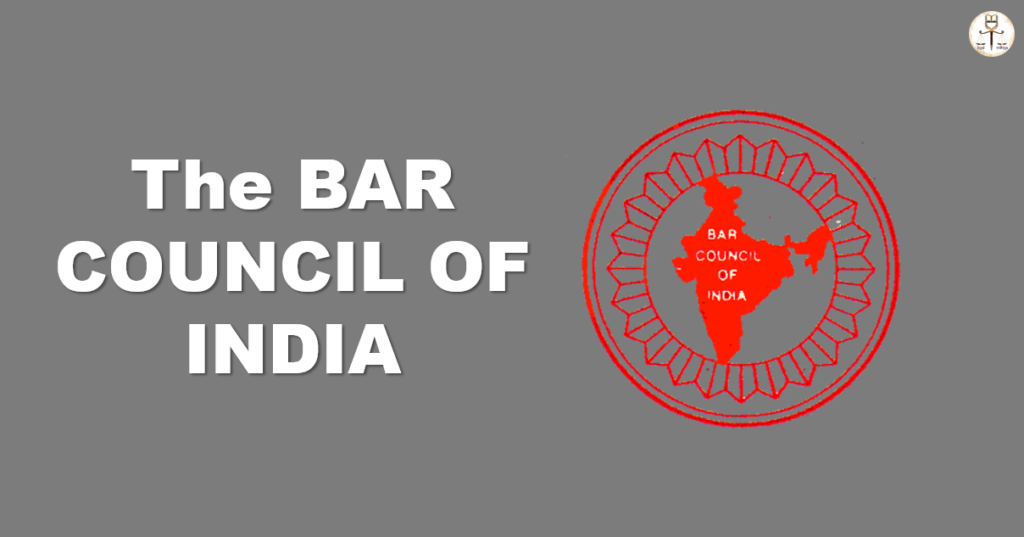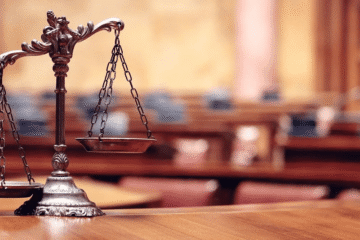
Bar Council Of India
Section 4 of the Advocates Act provides that there shall be a bar council for the whole of India and is known as the Bar Council of India.
Constitution of the Bar Council of India
There shall be the following members in the Bar council of India:
- Attorney General of India who is Ex- Officio member. (Section 4(1)(a))
- Solicitor General of India is Ex- Officio member. (Section 4(1)(b))
- One member gets elected amongst the member of each State Bar Council. ((Section 4(1)©)
- A Chairman and a Vice-chairman Section 4(2)
Attorney General and Solicitor general remains a member of the Bar Council of India till they hold their post.
Functions of Bar Council Of India
Section 7 of the Advocate Act lays down the functions of the Bar Council of India.
Following are the functions performed by the Bar Council of India:
- To frame rules related to professional ethics.
- To frame rules of procedure to be followed by the disciplinary committee of the State Bar Council and the Bar Council of India.
- To protect the rights of the Advocates.
- To encourage legal reforms.
- To decide matters related to professional misconduct transferred from a disciplinary committee of state bar council.
- To decide appeal against the disciplinary committee of state bar council.
- To supervise functions performed by the state bar council.
- To prescribe syllabus of law course after consulting state car council and university.
- To inspect university.
- To spend funds of Bar Council of India.
- To conduct elections
- To allow persons who studied abroad to practice in India.
Power to make rules
Section 15 of the Advocates Act gives power to the Bar Council to make rules to carry out its purpose. The rules are for:
- The election of members of bar council done by secret ballot includes conditions subject to which a person can exercise the right to vote by postal ballot.
- The election manner of a member of the Chairman and Vice-Chairman of the Bar Council
- To decide the doubts and disputes related to the election of the Bar Council members and appointment of Chairman and Vice-Chairman.
- To fill casual vacancies in Bar Council.
- The constitution of funds by the bar council
- Organising legal aid and advice to the poor.
- To summon and hold a meeting of the Bar council.
- To provide constitution and functions of the Bar Council, including the term of office of members of the committee.
The section of the Act also provides that no rules by the State Bar Council under this section shall have effect after approval from the Bar Council of India.
Disqualification of a member of Bar Council
Section 10B of the act states conditions related to disqualification of the Bar Council of India members.
An elected member of the Bar Council should vacate his office if he is declared absent without sufficient excuse for three consecutive meetings by the Bar council of state he is a member. The member can also be disqualified from being a member of the council if his name is removed from the roll of advocates or upon disqualification by any rule made by the Bar Council of India.
Disqualification of Enrolment
Section 24 A provides criteria for disqualification of a person for enrolment. A person gets disqualified from being enrolled as an advocate due to the following reasons:
- The person on conviction for an offence that involves moral turpitude.
- The person on conviction for an offence committed under the Untouchability (Offences) Act, 1955.
- For removal from government service on a charge that involves moral turpitude.
Such disqualification cease to have effect after two years has passed since his dismissal or release.
Status of Bar Council
Section 5 of the Advocates Act provides the Bar Council with body corporate. It provides the following features of the Bar Council:
- Body corporate
- Perpetual succession
- Common seal
Bar Council can have the power to acquire or hold property both movable and immovable. The Bar Council can acquire and hold a property. It can also enter into a contract on its name and sue and get sued in its name.
The staff of Bar Council
Section 11 of the Advocates Act, 1961 states that every bar council should appoint a secretary and an accountant. Any other staff member can be appointed as required, and the Secretary and accountant should possess skills as prescribed.
Membership in International Bodies
Section 7A of the Advocates Act provides that the Bar Council of India can become a member of the international legal bodies. The Bar Council can contribute an amount to such bodies by way of subscription and authorise expenditure if a representative participates in an international conference or seminar.




0 Comments